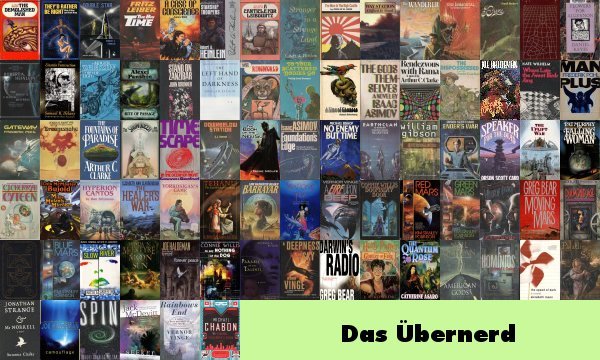 In this case that's a scan from my copy of the magazine; unlike the other artists I've shown so far his website hasn't been updated since 2005.
In this case that's a scan from my copy of the magazine; unlike the other artists I've shown so far his website hasn't been updated since 2005.So getting to the dramatic presentation nominees:
METAtropolis; written by Elizabeth Bear, Jay Lake, Tobias Buckell and Karl Schroeder; edited by John Scalzi - I'm getting this one out of the way first because it's the one that I haven't heard. In this case it's an anthology that was designed for being an audiobook. There is a printed version available but the audiobook is what has been nominated so I have not read it. On top of that it is only available as a download; a CD release is scheduled for just after the awards have been handed out. I don't buy media if I can't have a physical copy it so I won't be listening to METAtropolis for a while.
WALL-E; story by Andrew Stanton and Pete Docter; screenplay by Andrew Stanton and Jim Reardon; directed by Andrew Stanton - I just reviewed this as a Nebula winner and my thoughts have not changed. It's brilliant. A richer story more subtly told than you'd be able to guess just from the premise.
Iron Man; screenplay by Mark Fergus, Hawk Ostby, Art Marcum, and Matt Holloway; based on characters created by Stan Lee, Don Heck, Larry Lieber, and Jack Kirby; directed by Jon Favreau - I also kind of reviewed Iron Man already, though that wasn't much of a review since it was about how flawed the structure of the film was. I did not like this movie about an weapons manufacturer who turns altruistic after recieving a near-fatal injury and so builds a suit of power armor to bully third world nations. The action set peices were far too few and weren't interesting; when I'm watching an action movie I'll forgive flaws in all other areas than this since they're the reason the movie exists. I also found the main character to be completely unlikable.
The Dark Knight; story by Christopher Nolan and David S. Goyer; screenplay by Jonathan Nolan and Christopher Nolan; based on characters "created" by Bob Kane; directed by Christopher Nolan - I didn't review The Dark Knight because for two weeks after it was open you couldn't look at a website run by a nerd without being told how brilliant it is. I didn't need to add my voice to that. In this sequel (for the three of you who don't know about it) the Batman is still fighting crime in Gotham City and providing an inspiration but now the Joker has turned up intent on spreading chaos and tearing humanity down. This film is very effective mainly due to how Nolan split the hero and villain between morality and amorality instead of just immorality. Giving the villain equal time built him into an equal and the action set pieces were many and varied. It was the ideal superhero movie.
Hellboy II: The Golden Army; story by Guillermo del Toro and Mike Mignola; screenplay by Guillermo del Toro; based on the comic by Mike Mignola; directed by Guillermo del Toro - I found the first Hellboy movie to be a good effort but critically flawed in the pacing. A close but no cigar situation. This time around the pacing has improved, the art design has been pushed from "interesting" to "spectacular", but the story (which was never great to begin with) leaks out. The film is about a group of unusual beings who work for the US government to deal with supernatural threats. This time the threat is a group of elves who are seeking out an indestructable clockwork army so they can wipe out humanity. I enjoyed watching the film; the goofy characters are a lot of fun and the supernatural elements are terrific. I just something with a better plot.
So my ballot for this category would be:
WALL-E
The Dark Knight
Hellboy II
No Award
Iron Man
METAtropolis
Deciding between WALL-E and The Dark Knight was hard but I felt that WALL-E was the better production. METAtropolis is at the bottom solely because I have not listened to it and I won't be able to revise that opinion until after the award has already been handed out.
